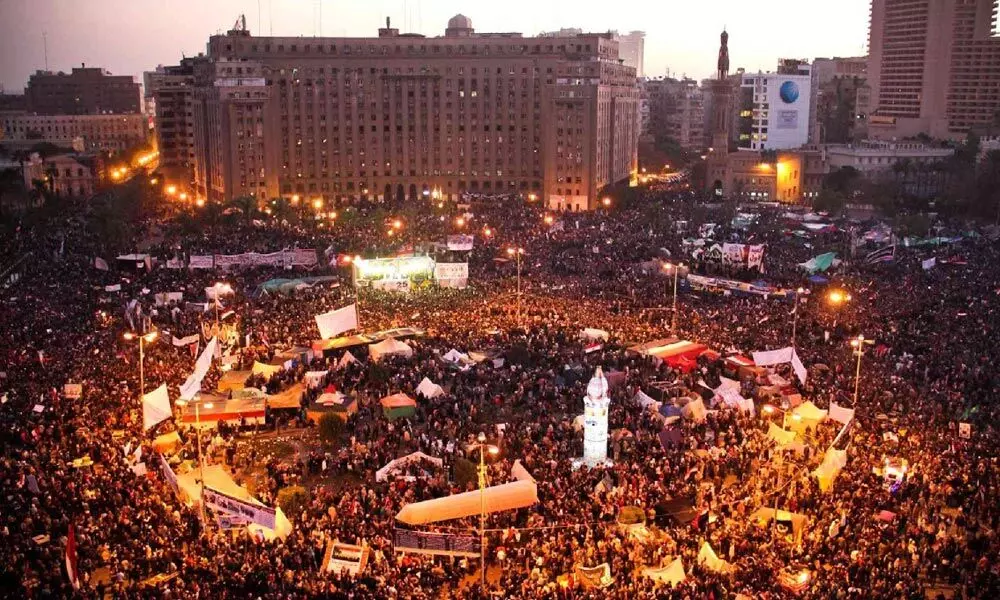Arab Spring showed autocracy is anything but stable
The refusal of many regimes to shed autocratic models of government, coupled with growing economic hardship, elevates the risk that authoritarian fragility will claim other victims in the coming years
image for illustrative purpose

IT has been 10 years since Egyptians first filled Cairo's iconic Tahrir Square for a series of protests that would, in less than a month, end the 30-year dictatorship of President Hosni Mubarak. Their success turbo-charged an Arab people-power movement that had already toppled an autocrat in Tunisia, inspiring millions throughout the Middle East and North Africa to rise against authoritarian regimes. Two more tyrants would fall, in Yemen and Libya, and other regimes would be shaken to their core.
A decade on, the promise of the Arab Spring persists in Tunisia, and in more recent developments Sudan. But in much of the region there has been a retrenchment of authoritarian rule, or state failure and civil war. Economies have collapsed; tens of millions have been displaced, and in many corners, violent conflict rages on, fuelled by the interventions of competing authoritarian regimes.
The region's autocrats argue that the lesson from the chaos and violence is that the Arab world is simply not suited for democracy. Many Western governments are at least sympathetic to this line of thinking: They embrace autocrats and theories of authoritarian stability, expressing only the faintest murmurs of concern over repression and other excesses all the while financing and arming many of the worst violators. This tendency was most recently on display when French President Emmanuel Macron, playing host to President Abdel-Fattah El-Sisi, rejected calls to condition arms sales to Egypt on human rights, arguing untenably that such conditions could add to political fragility.
But the Arab Spring actually demonstrated that the opposite is true. The chaotic, unpredictable and uneven fashion in which regimes entered into crisis and collapsed, along with the societies they ruled for decades, shows that authoritarianism is both highly fragile and a major source of violent turmoil. In 2011, the rulers of Tunisia, Egypt, Yemen, and Libya were overthrown while Syria fell into civil war and Bahrain had to invite foreign military forces to quash its massive uprising against the monarchy.
This is not to say any particular authoritarian government has an expiry date. But even when they endure, but they face a persistent risk of violent turmoil and sudden collapse.
The turmoil is the product of authoritarianism. The most common cause of violence is the autocrat's attempt to impede democratic transitions by brute force. This is best exemplified by Bashar al Assad's repression of the Arab Spring uprising in Syria, with the backing of fellow tyrants in Iran and Russia.
The second source of turmoil is the weakness of states, kept that way by despots who fear strong, credible and diffuse governing institutions. When dictators are overthrown, the absence of such institutions can lead to state failure, as was the case in Libya and Yemen.
And yet, this was enough to cause conniptions in the government with statements from the presidency, parliament and the defense ministry. Initially, Sisi insisted the new palaces were part of the new state he was building. Following the protests, he struck a conciliatory tone, promising to add more Egyptians to subsidy rolls. At the same time, thousands were arrested to quash the risk of protests snowballing into 2011 proportions.
All this, remember, in response to some Facebook videos and a few thousand protestors scattered across a country of 100 million people. The government's response speaks not to stability but to paranoia, stemming from the knowledge that authoritarian rulers can fall quickly.
The grievances that brought Egyptians to the streets in 2011 and 2019 are shared by many across the region. Anti-government protests in the past two years have brought down autocrats in Sudan and Algeria, as well as governments in Iraq and Lebanon. The refusal of many regimes to shed autocratic models of government, coupled with growing economic hardship, elevates the risk that authoritarian fragility will claim other victims in the coming years. (Bloomberg)

